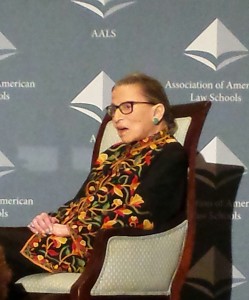The Notorious R.B.G.
 Those of us who teach in gender and feminist studies have long been familiar with Justice Ruth Bader Ginsburg; we regularly deal with her work as both a lawyer and as jurist. This past January, I had the honor of hearing her speak at a conference in Washington, D.C., and was awed by her. So over spring break, I decided to start reading a new book, The Legacy of Ruth Bader Ginsburg, edited by Scott Dodson. I’m not that far into the book yet, but what I’ve read has only made me admire her more.
Those of us who teach in gender and feminist studies have long been familiar with Justice Ruth Bader Ginsburg; we regularly deal with her work as both a lawyer and as jurist. This past January, I had the honor of hearing her speak at a conference in Washington, D.C., and was awed by her. So over spring break, I decided to start reading a new book, The Legacy of Ruth Bader Ginsburg, edited by Scott Dodson. I’m not that far into the book yet, but what I’ve read has only made me admire her more.
I’m far from being Justice Ginsburg’s only admirer. She has quite the following, including this woman, who had a portrait of Justice Ginsburg tattooed on her arm. One man put her 35-page dissent in Burwell v. Hobby Lobby to music. Another admirer dubbed her “The Notorious R.B.G.,” a take-off on rapper The Notorious B.I.G, and there’s a whole blog devoted to all things R.B.G. Google “Notorious R.B.G.” to find t-shirts and other merchandise. It’s a title the Justice herself seems to enjoy. (Listen to the video clip here.)
Ironically, while I was starting my book over spring break, Justice Ginsburg celebrated her 82nd birthday. She seems in no way ready to step down from the court. After all, she reminds us, Justice John Paul Stevens served until he was 90. In honor of her birthday, one site gathered some of her best quotes. My favorite: “People ask me sometimes . . . When will there be enough women on the court? And my answer is: When there are nine.”
Wouldn’t have expected anything less from her.
